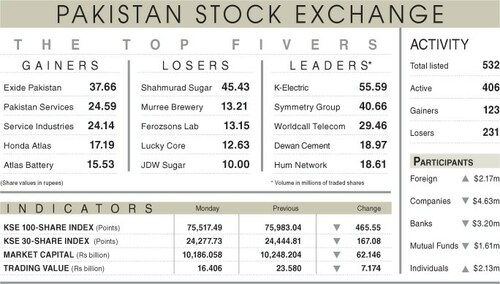ISLAMABAD: Gains from low oil prices can be substantial for developing countries’ importers if supported by stronger global growth, says a World Bank Group analysis of the oil price decline.
The analysis, published in the latest edition of ‘Global Economic Prospects’, says that soft oil prices are expected to persist in 2015 and will be accompanied by significant real income shifts from oil-exporting to oil-importing countries.
For many oil-importing countries, lower prices contribute to growth and reduce inflationary, external, and fiscal pressures. The report hinted that oil prices are expected to remain low over the 2015-16 period, implying that their impact on inflation is expected to be mostly temporary, dissipating by the end of 2016.
According to the report, the decline in oil prices reflects a confluence of factors, including several years of upward surprises in oil supply and downward surprises in demand, receding geopolitical risks in some areas of the world, a significant change in policy objectives of the Organisation of the Petroleum Exporting Countries (Opec), and appreciation of the US dollar.
Although the relative strength of the forces driving the recent plunge in prices remains uncertain, supply related factors appear to have played a dominant role, it says.
However, weak oil prices present significant challenges for major oil-exporting countries, which will be adversely impacted by weakening growth prospects, and fiscal and external positions. If lower oil prices persist, they could also undermine investment in new exploration or development. This would especially put at risk investment in some low-income countries, or in unconventional sources such as shale oil, tar sands, and deep sea oil fields.
The analysis on oil prices in Global Economic Prospects is complemented by two special features on how trends in global trade and remittance flows are impacting developing countries.
Global trade expanded by less than 3.5 per cent in 2012 and 2013, well below the pre-crisis average annual rate of 7pc, holding back developing country growth in recent years.
Weak demand, mainly in investment but also in consumer demand, is one of the main causes of the deceleration in trade growth. With high-income countries accounting for some 65pc of global imports, the lingering weakness of their economies five years after the crisis suggests that weak demand continues to adversely impact the recovery in global trade.
Published in Dawn, January 10th, 2015
On a mobile phone? Get the Dawn Mobile App: Apple Store | Google Play















































Dear visitor, the comments section is undergoing an overhaul and will return soon.